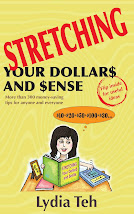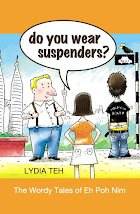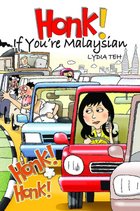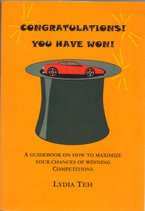 During my book-signing event for Life's Like That at MPH Mid Valley Megamall last year, I gave a talk on this topic. I'm reproducing it here for the benefit of beginners who are interested in writing articles.
During my book-signing event for Life's Like That at MPH Mid Valley Megamall last year, I gave a talk on this topic. I'm reproducing it here for the benefit of beginners who are interested in writing articles.How long does it take you to read a feature article in the newspapers or magazine? Five minutes? Ten minutes? To make that article readable in five minutes, the writer would have spent hours on crafting the article.
Every article in my book took me a minimum of three to four hours, some five to six hours to complete. Don’t believe what you see in the movies. In pre-computer times, you see the writer inserting a piece of paper into the typewriter and he starts hammering out this beautiful prose. Today, the writer is depicted at the computer typing perfect prose, with the words flowing out easily like water from the tap. This is not true. In real life there are lots of mistakes made, plenty of backspacing, editing and rewriting before the piece is fit to be read.
This is my modus operandi.
1. Research
If it’s a personal experience piece, there’s minimal research to be done. For example when I wrote an article about cooking frog porridge, the only research I had to do was to call up my uncle to ask, “What did you use to catch the frogs?” With the availability of the Internet, research can be easily carried out without stepping out of the house. Need some facts and figures? Surf the Internet. Need to conduct interviews? Email the interviewees.
2. Draft
First I write down a few salient points. I may do this on paper or type them out straightaway. Then I flesh out the article. This first draft is not fit to be seen by other eyes. The English is bad, the points jump all over the place, it’s just a hodge-podge of words. Whatever comes to mind, I put it down, without any regard to sentence structure, grammar, vocabulary etc.
3. Rewrite
This is the difficult part for me. Going through the article, reorganizing ideas and paragraphs, tying the pieces together, linking paragraphs into a smooth flow, pruning sentences and getting rid of excess baggage is a challenge. I find it easier to do this on paper rather than on the screen. After I’m done with the rewrite, my draft looks like a hurricane has swept through it, with arrows and words filled in this corner and that, asterisks and hashes and numbered points criss-crossing all over the place.
4. Edit
It’s back to the computer to tidy up the article. Then I go through it again to make it more readable, check the tenses, make sure the right word is used and tighten the piece some more by taking out anything superfluous or adding more information where it’s needed.
5. Edit again
I print out the edited piece and go through another round of editing. Sometimes at this stage, I get the Eureka moments when I suddenly think of a better way to express an idea or a better word to use.
6. Read it out loud
Reading it out loud helps especially when I’m not sure if a sentence sounds right. I may discover awkward sentences which looked okay on paper but when read out loud, they sound clumsy.
7. Put it aside
I put away the article for a while. It could be for a couple of hours or overnight. When I come back to the piece later, I’d read it with fresh eyes and see mistakes which just pop out of the page.
Does it seem like writing is a lot of work? Who says writing is a piece of cake anyway? Though some have a natural flair for writing, most of us have to hone our craft diligently. As they say, practice makes perfect. For writers, it’s a case of “Writing makes perfect.”

















7 comments:
Good solid advice, Lydia. I always go through a "despair draft" when nothing seems to come right, and then the next time I look at the article, the ideas just flow and in the right words. time between draughts always works for me, and I agree with you entirely about reading out loud.
Thanks Lydia. A bit too late for my dissertation...! But I find that the best ones are those that you write at the spur of the moment. I tend to do too much research and there's no stopping! Never read aloud before - malu!
Thanks for this entry Lydia! I think I should hook you up with my mom tee heee
Sharon, Kak Teh : Sometimes I cheat, skip the reading aloud bit, that's how those clunkiness crept into some articles. But sshhh... don't tell ah, afterwards nobody wants to buy my book.
Nadia, Your mum writes too? Come, come, the more the merrier.
you forgot the part where you type type tyoe, then scream at the computer for a while, go for tea, watch a little TV, and then come back to stare at the unfinished story thinking, "Eh, how am I going to finish this?"
:)
Eyeris
Actually that part comes under point 2 and 3 but I didn't put in because dowan to discourage beginners mah. Since you brought it up, ok, confession time. But I don't scream at the computer, okay, I just go and read The Star, stare at the garden (green grass to improve failing eyesight), read other people's blogs, check my email, water the garden, plan what to cook for dinner and daydream about writing my blockbuster novel. Now that I'm writing a blog, it's worse, aaahhh....
Rather disputable.
Post a Comment